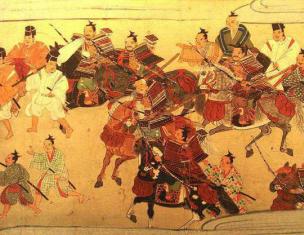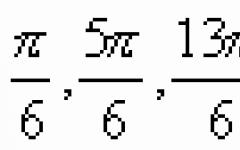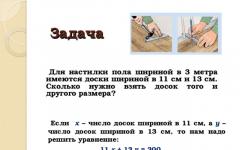Passé composition de l'indicatif (past compound or past complex) is the indicative tense, which expresses completed actions in the past.
Elle a mange un bonbon.- She ate candy.
Michel est day parti. – Michelle already left.
J" ai recu cette lettre hier.- I received this letter was yesterday.
Formation of forms
Forms passé composition are formed with the help auxiliary verb(avoir or être) in the present tense and participe passé(past participle) of the semantic verb. Since the conjugated part of a complex form is an auxiliary verb, the negative and interrogative forms are constructed using the verbs avoir and être.
| Passé composé with verb avoir | ||
|---|---|---|
| Affirmative form | Negative form | Interrogative form |
| j" ai travaillé tu as travaillé il a travaillé nous avons travaillé vous avez travaillé ils ont travaillé |
je n"ai pas travaillé tu n"as pas travaillé il n"a pas travaillé nous n"avons pas travaillé vous n"avez pas travaillé ils n"ont pas travaillé |
Est-ce que j" ai travaillé? As-tu travaillé? A-t-il travaillé? Avons-nous travaillé? Avez-vous travaillé? Ont-ils travaillé? |
| Passé composé with verb être | ||
|---|---|---|
| Affirmative form | Negative form | Interrogative form |
| je suis arrivé(e) tu es arrive(e) il(elle) est arrivé(e) nous sommes arrive(e)s vous êtes arrive(e)s ils(elles) sont arrive(e)s |
je ne suis pas arrive(e) tu n"es pas arrive(e) il(elle) n"est pas arrive(e) nous ne sommes pas arrive(e)s vous n"êtes pas arrive(e)s ils(elles) ne sont pas arrive(e)s |
Est-ce que je suis arrivé(e)? Es-tu arrive(e)? Est-il(elle) arrive(e)? Sommes-nous arrive(e)s? Êtes-vous arrive(e)s? Sont-ils(elles) arrive(e)s? |
In addition, you can familiarize yourself with the conjugation of verbs of the first, second and third groups on the page Typical conjugation of French verbs.
Meaning and usage
Passé composition serves to express a completed action that occurred in the past. In Russian it can correspond to the past tense of perfective verbs, for example did, looked, ate, and the past tense of imperfective verbs, for example did, saw, ate.
The main meaning of this tense is to indicate events related to the present.
J"ai mangé un sandwitch et je n"ai pas faim maintenant.
I ate a sandwich and am not hungry now.
Les enfants sont déjà arrives.
The children have already arrived.
At the same time, in modern French, especially in colloquial speech, passé composition widely used to indicate completed actions in the past that have no connection with the present. In writing, this meaning is usually expressed by the tense passé simple.
Napoleon est mort en 1821.
Napoleon died in 1821.
The following usage cases deserve special attention: passé composition:
Passé composé is used if the time limits of action are indicated: pendant trois jours, deux heures, jusqu"à ..., depuis ...
Elle a écouté la music jusqu"à dix heures
.
She was listening to music until 10 o'clock.
Il est resté au bureau deux heures.
He was in the office two hours.
Passé composé is used when we are talking about repeated actions, and the limit of these actions is indicated.
Il a pose cette question quelques fois.
He asked this question several times.
Marie a recommencé le travail à plusieurs reprises.
Maria started this work several times.
Passé composition can be used to indicate the beginning of an action.
Soudain, elle a pleure.
She suddenly began to cry.
Passé composé can be used to indicate an action that has just taken place. The same meaning in French can be expressed using a different tense - passé immediat.
Elle est sortie tout à l"heure.=Elle vient de sortir.
She just left.
J" ai repondu tout à l"heure. = Je viens de répondre.
I just answered.
In some cases, especially in colloquial speech, passé composé can be used to express a completed action in the future: in simple sentences - with the verbs finir, achever, terminer ( end, complete); in complex sentences - after the preposition si If.
Il est temps de partir. – Attends, j"ai fini dans un instant.
It's time to leave. - Wait, I'll finish in a minute.
Si dans une minute tu n"as pas fini, je partirai sans toi.
If you don't finish in a minute, I'll leave without you.
In French, the verb form is very diverse. This is especially true for the past tense. In the indicative mood there are 5 past forms, one of which is passé composition(past complex).
Passé composition:
- Expresses: an action that is completed, took place in the past, or precedes an action in the present.
- Used both orally and in writing. It is translated into Russian using perfective and imperfective verbs.
- Formed using the present tense of an auxiliary verb ( avoir or être) + participe passé (past participle) of the conjugated verb.
PARTICIPE PASSE is formed differently for different groups of verbs (see table):
Example of conjugation in the past tense of verbs Parler/Finir/Etre:
- j'ai parlé,tu as parlé, il a parlé elle a parlé, nous avons parlé, vous avez parlé, ils ont parlé, elles ont parlé
- j'ai fini,tu as fini, il a fini elle a final nous avons fini, vous avez fini, ils ont fini, elles ont fini
- j'ai été,tu as été, il a été elle a été, nous avons été, vous avez été, ils ont été, elles ont été
C être verbs are conjugated :
- Mourir, naître, arriver, partir, aller, venir, sortir, entrer, tomber, rester, descendre, monter
- Some derivatives from them (revenir, devenir, rentrer)
- Pronominal reflexive verbs (se laver, se lever)
WITH avoir conjugate : all other verbs, including avoir And être
A detailed table of verb conjugations is given A for the forms of the past participle (participe passé) of the main verbs of all groups, see
Participate passé verbs conjugated with Etre consistent with sort of And number with a subject (for feminine gender – add at the end E, for plural add at the end S). For example:
- Aller
je suis allé, tu es allé, il est allé elle est allée, nous sommes allés, vous etes allés ils sont allés, elles sont allées
Participate passé verbs conjugated with Avoir consistent with sort of And number With direct object, if it is located before the verb Avoir:
1) The direct object is expressed by a direct object pronoun
- Repétez votre question je l'ai mal compris e(comprendre la question)
2) The sentence begins with question words quel And combien de (For"combien"not necessary)
- Quels livres avez-vous achete s? (acheter les livres)
3) In sentences with a construction … que (qu’) … , where que - “which, which, which, etc.”
- Les fautes que vous avez fait es(faire les fautes)
Negative and interrogative forms in the past tense using the example of a verb Parler:
- Je n'ai pas parlé
- Tu n'as pas parlé
- Il n'a pas parlé
- Nous n' avons pas parlé
- Vous n'avez pas parlé
- Ils n'ont pas parlé
- J'ai parlé. - Ai-je parlé?
- Tu as parlé. - As-tu parlé?
- Il a parlé. -A- t-il parle?
- Nous avons parlé. — Avons-nous parlé?
- Vous avez parlé. - Avez-vous parlé?
- Ils ont parlé. — Ont-ils parlé?
After studying the forms of the present tense, you can safely move on! And in this lesson we will take a small step back - i.e. into the past, and learn how to talk about events that have already happened.
Using Passé composition
Let us remind you that passé composition used in colloquial speech and correspondence, and also common in the press.
Passé composition used to express a completed, perfect action, the result of which is visible in the present. Most often, the verb in this form answers the question “what did you do?” If the verb answers the question “what did you do?”, then the sentence must indicate the time the action was performed. Also remember that these are difficult times.
Verbs are needed to form this form etre or avoir in the present tense and participe passé(past participle).
Formation of past participles
Before you know what verbs it's used with etre, and with which ones - avoir, Let's figure out how the past participle is formed. It's not all that complicated. The participle of a verb is formed by adding a specific ending to its stem.
Participe passé of verbs of group I have an ending -e:
habiter - habité, parler - parlé.
Participe passé of verbs of group II ends with -i:
grandir - grandi, choisir - chosi.
Participe passé of verbs of group III, as you might have guessed, have different endings. They need to be memorized and checked with tables. For example: vouloir – voulu
Verbs of the third group have typical endings that will help you remember the formation of the participle form:
1) Verbs aller, être, naître are likened to the verbs of the first group and receive the ending «é»:
allé, né, été.
2) Verbs to -tir, -mir get cum -i: partir - parti.
3) Verbs prendre, mettre and similar verbs receive an ending -is: prendre – pris, permettre – permis
4) Verbs ecrire, faire, dire have shapes écrit, fait, dire dit respectively
5) Verbs to -frir, -vrir get cum rt: offrir – offert
The most common ending for participles of verbs of the third group is the ending -u: lire – lu, voir – vu.
Education Passé composé
Let's look at a few examples of education passé composition with verbs from different groups.
| Parler - talk | |||
|---|---|---|---|
| je | ai parlé | nous | avons parlé |
| tu | as parlé | vous | avez parlé |
| il, elle | a parlé | ils, elles | ont parlé |
| finir – to complete | |||
|---|---|---|---|
| je | ai fini | nous | avons fini |
| tu | as fine | vous | avez fini |
| il, elle | a fine | ils, elles | ont fini |
| voir - to see | |||
|---|---|---|---|
| je | ai vu | nous | avons vu |
| tu | as vu | vous | avez vu |
| il, elle | a vu | ils, elles | ont vu |
The most important thing is not to forget the verb conjugation avoir in the present tense. The second important point: know which verb requires an auxiliary verb avoir, and what - être.
So, with the verb être form passé composition form:
all reflexive verbs (we will talk about them separately in one of the following lessons);
some verbs of movement and change of state:
enterr- enter
sortir- go out
aller- go
venir- come (from somewhere)
arrive- come (somewhere)
partir- leave
revenir– return
renter– return
rester- stay
devenir- become
monter– rise
descendre- go down
naître- to be born
mourir- die
tomber- fell
passer– pass (through)
Accordingly, the verb avoir required for all other verbs.
An important feature of verbs forming passé composition with verb etre- This means that the past participles agree with the subject in gender, number and case. For example:
| venir | |||
|---|---|---|---|
| je | suis venu(e) | nous | sommes venu(e)s |
| tu | es venu(e) | vous | êtes venu(e)(s) |
| il, elle | est venu(e) | ils, elles | sont venu(e)s |
As you can see, the ending "s" indicates the plural, and the vowel "e"- into the feminine gender.
With verb avoir You don’t need to agree on anything!
Lesson assignments
Exercise 1. Classify the verbs into those that form the passé composé form with the verbs avoir and être.
Être, parler, partir, grandir, venir, boir, sortir, pouvoir, avoir, dire, passer, comprendre, tomber
Exercise 2. Conjugate the verbs. Don't forget about participle agreement if the auxiliary verb is être.
Partir, habiter, rester, grossir, dire
Answer 1.
avoir: parler, grandir, boir, pouvoir, avoir, dire, comprendre
être: partir, venir, sortir, passer, tomber
Be sure to watch the video lessons on this topic BEFORE you start reading the text. The topic in the video is explained very simply - this will remove your fear of the topic and save time on studying.
The past tense can be expressed in different ways in French. The main thing is what you want to focus on (whether the action ended or not, it happened quite recently or a very long time ago...).
Passé Composé tense is necessary when we want to emphasize:
Action in the past it's over(the verb will answer the question “what did you do?”):
Il a parlé de son voyage. – He told about your journey.
The verb can also answer the question “what did you do?”, but it will indicate “ with how many and to“how much”, that is limited time period:
Il a parlé pendant une heure. – He spoke for an hour.
Passé Composé is formed using auxiliary verbs
avoir or ê tre and itself verb in past tense(participe passé).
How can we decide whether avoir or ê tre will help us form this tense?
The verb ê tre is conjugated with:
- All returnable verbs,
- and also the following verbs of movement and change of state:
| entrer – to enter | sortir – exit |
| aller - to go | venir come (from somewhere) |
| arrive - come (somewhere) | partir - to leave |
| revenir – return | renter – return |
| rester - stay | devenir – to become |
| monter – to rise | descendre – to go down |
| naître – to be born | mourir – to die |
| tomber – to fall |
Conjugate with the verb avoir all other verbs.
How the verb itself is formed in the past tense:
Verbs first group forming the past form is very simple: ending -er be replaced by -é :
travailler – travaillé
Past tense for verbs 2nd group is formed even more simply: just remove the ending -r :
| lire-lu | pouvoir – pu |
| voir – vu | boire-bu |
You can also just remember typical endings for verbs in the past tense:
ending - é
This applies to verbs 1 group(with an infinitive to - er), as well as irregular verbs aller, ê tre, na ître:
| dessiner (to draw) | dessiné (drawn) |
| aller (to go) | allé (went) |
| naître (to be born) | ne (born) |
| être (to be) | été (there is no adequate Russian translation here) |
ending - i
This applies to verbs 2 groups(with an infinitive to - ir), as well as irregular verbs ending in - tir , -mir :
ending - t
For the verbs écrire, faire, dire:
ending - rt
For verbs ending in - frir, -vrir :
aller
| Je suis allé (e) | Nou s sommes allé(e)s |
| Tu es allé(e) | Vou sêtes allé(e)s |
| Il (on) est allé | Il s sont allés |
| Ell e est allee | Ell es sont alleees |
Attention! Remember that when a verb changes into the past tense with ê tre, it must be of the same gender (masculine – feminine) and number (singular – plural) as the subject it refers to.
Il est entré dans la chambre. – He entered the room (literally: He there is in shiy).
Elle est entrée dans la chambre. – He A entered A into the room (literally: she there is in oh).
Ils sont entrés. – He And entered And (They there is in no).
Elles sont entrées. – They (the women) entered.
Vou s vous etes bien amuses? – Did you have fun?
If you noticed, we coordinated the past tense form of the verbs (we made them the same in gender and number) with the subject. (I, you, we...), since the auxiliary verb was ê tre.
When the auxiliary verb is avoir, with a subject no need to coordinate.
Il a lu cette nouvelle. – He read this novella (he has read the novella).
Elle a lu cette nouvelle. – She read this novella (she has read the novella).
Doesn't matter Who(he or she) read the novella. The word “read” refers to the novella itself! That is why it does not need to be coordinated with the subject “he – she”.
BUT! If we replace the word “short story” with the corresponding pronoun - object(short story - her), then according to the rule it will appear before the verb (in the case of this past tense before the auxiliary verb). And then we will have to reconcile it with the past tense form. Why? As always evident from the literal translation))
Il l "a lue (il la a lue). – He read it (he her has read Noah).
Elle l"a lue. – She read it (she her has read nnoy).
In both cases, the short story was read, although now it has been replaced by the word “her,” that is, here we must agree on the feminine gender.
Il les a lues. – He read them (he has them read).
Feminine and plural agreement.
When negated, the particles ne and pas surround auxiliary verb (avoir or ê tre):
Ils n " ont pas encore mangé. – They haven't eaten yet.
Ils ne sont pas encore partis. – They haven't left yet.
Attention! When we deny returnable verb, do not forget that the part of it is reflexive pronouns is part of it (although it stands before it), and therefore is denied along with it:
Je ne me suis pas réveillée. – I didn’t wake up.
The same applies to pronouns - objects(me, you, them...). They will also stand before the auxiliary verb and negated with it.
Je lui ai telephone. - I called him.
Je ne lui ai pas telephone. – I didn't call him.
Attention! Very important!
Some verbs can also be conjugated with avoir (if after them will just stand word without preposition), and with ê tre (when after it there will be some pretext). At the same time, they will change their meaning.
Je suis descendue de la voiture. – I got out (descended) from the car.
J"ai descendu ma valise. – I lowered my suitcase.
Je suis passée devant ta maison. – I walked in front of your house.
J"ai passé mes vacanciesà l "étranger. – I spent my holidays abroad.
Je suis sortie de la maison. – I left the house.
J"ai sorti me papiers. – I pulled out my documents.
If you need explanations of this grammar topic in voice, as well as an additional set of exercises, you can find it in our audio course








